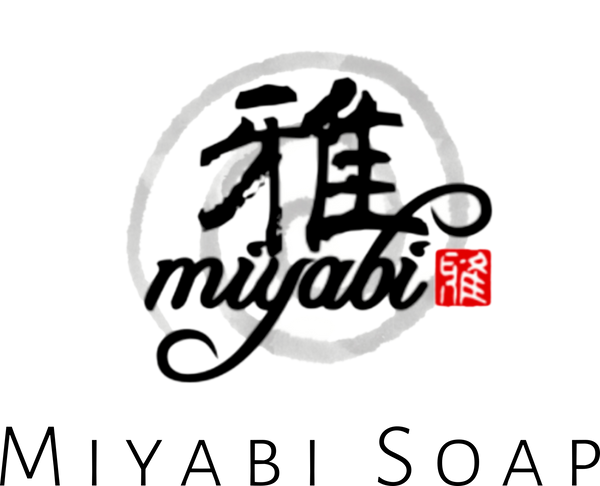Seeking beautiful soaps that are gentle on the skin
Crafting High-Quality Soaps with Over Two Decades of Soap-Making Experience and Expertise as an Analytical Chemist

"The simplest soap is the most beautiful."
I deeply believe in the beauty of simplicity. Simple soaps have their own unique beauty, and true elegance is found within their simplicity.
The Japanese aesthetic philosophy known as 'Wabi-Sabi' appreciates the beauty found in imperfections, impermanence, and simplicity in both nature and life. With this philosophy as my guiding light, I continually pursue soaps that embody the true beauty of simplicity.
The name "Miyabi, 雅", which translates to elegance and grace in Japanese, is also my own name in Japanese characters.
It would be an absolute pleasure to introduce you to the enchanting world of handmade soap.
Miyabi Soap
Masako 雅子

Miyabi Soap Story
MORE THAN TWO DECADES OF SOAP-MAKING EXPERTISE
Even today, I clearly recall the excitement I felt two decades ago when I first used a handmade soap. This soap not only cleansed my skin but also provided more moisture than any skincare product I had used before. This enchanting experience served as the inspiration for my journey into soap making.
The experience of my child having eczema prompted me to start making soap for babies and children with sensitive skin. Currently, I continue to create gentle soaps suitable for all skin types. The soap with especially effective anti-aging benefits is the one I am presently most interested in and dedicated to.
I intend to continue creating high-quality soaps, emphasizing my philosophy that "the simplest soap is the most beautiful".

Scientifically Verified High-Quality of Miyabi Soap
AS AN ANALYTICAL CHEMIST
"Why are handmade soaps so good for the skin?"
This question has fascinated me since I started using handmade soaps. Several years later, this enduring curiosity motivated me to pursue studies in analytical chemistry. I then made the decision to return to college and begin learning this field from the beginning.
While in college, I delved into the theory of analytical chemistry and acquired skills in operating analytical equipment. During my final project, I used this knowledge to conduct a thorough analysis of the components in my handmade soaps, comparing them to mass-produced commercial soaps.
The results were clear. My soaps were rich in glycerin and beneficial fatty acids, making them highly nourishing and gentle on the skin. In contrast, commercial soaps contained very little glycerin and a multitude of synthetic additives.
This experiment proves that glycerin produced during the saponification reaction remains in handmade soaps, while it is removed in commercial soaps. It clearly shows that commercial soaps are primarily composed of detergents, foaming agents, and synthetic ingredients. Consequently, they cannot be classified as true 'soap' by definition.
There are several definitions of soap, but according to the terminology of the International Union of Pure and Applied Chemistry (IUPAC), "'soap' is a general term used to refer to alkali salts (whether inorganic or organic) of fatty acids or mixtures of fatty acids containing at least eight carbon atoms."
The results of the final project have experimentally demonstrated that my handmade soaps are superior to commercial ones. Applying my expertise as an analytical chemist, I will continue to refine my skills to produce the highest-quality and most authentic soaps.

What is the best soap for the skin?
The properties of oils used as ingredients in soap greatly influence the characteristics of the soap. Each oil has its own unique qualities, contributing to aspects such as lather and hardness in soap, as well as providing moisturizing components and nutrients for the skin.
An ideal soap is one that is firm, gentle on the skin, and produces a good lather. However, not all oils are beneficial for the skin.
It's important to note that oils contributing to lather and hardness in soap can be irritating to the skin if used excessively. To avoid these risks, Miyabi Soap minimally uses oils that contribute to lather and hardness.
As a result, Miyabi Soaps have a soft texture, dissolve easily, and have minimal lather, making them exceptionally gentle on the skin. Additionally, the essential oils are carefully measured to be optimal for the skin.
In summary, the ideal soap for the skin is one that is soft, produces a gentle lather, and has a light fragrance.
Two Tips to Enjoy Miyabi Soap
-

1. Use a Bath Sponge
Use a bath sponge to create a good lather, especially in hard water. The quality of water is important for making soap bubbles. Hard water, which contains soluble magnesium and calcium salts, hinders soap lathering. On the other hand, soap lathers well in soft water. A bath sponge can help create good foam in both cases.
-

2. Dry on a Draining Soap Dish
To make your soap last longer, keep it dry on a draining soap dish after each use. Since Miyabi Soap is soft, it can quickly melt if not dried properly. Avoid soap dishes without a drainage option, as pooled water at the bottom can dissolve the soap.


